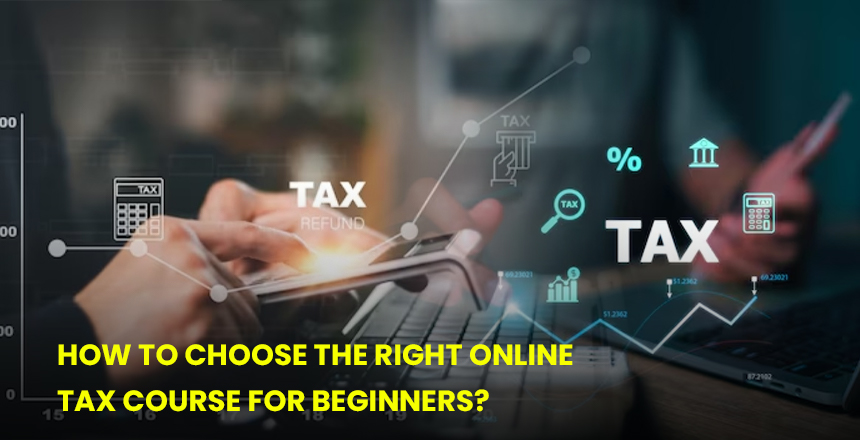Back when we lived in the analog era, financial literacy was not a priority and understanding taxation never popped into mind – until today. Irrespective of whether you are a student, freelancer, entrepreneur or a working professional, enrolling yourself in the online tax for beginners course can simplify the complex world of income tax and GST.
Finding the right tax course for beginners becomes difficult with so many options indeed available online. In this blog, you’ve come to the right place: it will walk you through; how much it costs, it’s worth and everything else you need to know about its course content, tutorials, certifications, and even, its instructor qualifications.
1. Look for a Beginner-Friendly Curriculum
The first necessity when selecting a tax course is that it explains the fundamentals of taxation. A taxation course for beginners should be well structured and it should include:
- Introduction to Indian Income Tax (or relevant country)
- Tax slabs and rates
- ITR forms and e-filing process
- Deductions and exemptions (like “Section 80C”, HRA, etc.)
- TDS and Advance Tax
- Basics of GST (for business owners and freelancers)
- If the jumping in to the rich Legal jargon without laying ground in basics may not instros suitable for noobs.
Keyword highlight: “taxation course for beginners”, “income tax basics”
2. Check the Instructor’s Credentials
The success of a course depends upon its instructor. You should take a moment to check up on the background of whoever you are going to browse online. Look for:
- Certified professionals such as “Chartered Accountants”, “CPAs”, or tax consultants
- Real world taxation experience of any kind (real world experience in the actual practice or teaching)
- Positive student feedback and ratings
- Also, practical filing demos and case studies of the filing expert instructors provide more value than theoretical only content.
- Keyword highlight: “online tax course with expert guidance”
3. Evaluate the Learning Format
Every learner is different. Think of how you will best learn and according to your schedule. Common types include:
- Video lectures recorded in advance (also called pre-recorded video lectures): For self paced learning
- Interactive live classes: best for the direct interaction and answering questions
- Quiz and hand on assignments aim at reinforcing your understanding.
- Downloadable tax tools or worksheets: Useful for real-life application
- A decent online tax course would have a mixture of modules such as theory, practice and revision modules.
- Self paced tax course; interactive tax classes; Keyword highlight.
4. Certification and Career Benefits
If you are taking up the course for career growth then make sure the course provides a recognized certificate. Many professional tax courses partner with:
- Government-recognized platforms like NSDC or Skill India
- TaxGuru Edu or CAclubindia, CA networks, tax institutions, etc.
- Educational marketplaces like Coursera, Udemy, and LinkedIn Learning
- A certification helps with boosting your resume and can help you get freelance tax jobs or assistant roles in CA firms.
- Tax certification for beginners or income tax course with certificate
5. Read Reviews and Ratings
- Student reviews are a reliable source. Look for:
- Average ratings (4.3+ is ideal)
- Clarity of explanation
- Real-life examples
- Instructor support
- Courses available on any of such platforms usually come with detailed feedback which typically helps you decide if it is what you were looking to learn or not.
“Top rated online tax course” is the keyword highlight.
6. Cost vs. Value
There are more than enough free tax courses online, but the best beginning tax courses are paid but cheap. Here’s how to evaluate value:
| Price Range | What You Should Get |
| ₹0–₹1,000 | Basic tax awareness, no certification |
| ₹1,000–₹3,000 | Comprehensive beginner content with assignments |
| ₹3,000–₹10,000 | Certified courses with placement assistance or mentoring |
A paid course that actually offers gained skills, downloadable resources and free access for a lifetime and is certified, it’s most likely a smart investment.
Keyword highlight: “affordable tax course online”, “free tax course for beginners”
7. Extra Features That Add Value
- The best courses, however, are not only videos. Look for these extras:
- Live filing walkthroughs on the government income tax portal
- Updates on tax law changes
- Ability to join a discussion forum or Telegram group
- Complete mock filing given in practice case studies.
- They assist you to apply the knowledge that you have just learnt practically and keeping up to date.
Popular Platforms to Consider
Here are some trusted websites through which one can explore quality online tax courses:
- Udemy: Budget-friendly with lifetime access
- Academic (peer discussions or not) from Coursera
- CAclubindia: Tailored for commerce and finance students in India
- The TaxGuru Edu: courses based on industry tax and finance.
- Skillshare: Subscription-based with beginner modules
Final Thoughts
Financial independence requires a solid understanding of taxation and it also provides career opportunities such as in tax consultancy, compliance and finance. But for a beginner online tax course, it should be simple and provide clarity, practical insight, certified completion, and long term value.
Read through the course syllabus, instructor background, learning tools and the community support you have before enrolling. This small investment of time and money may or may not fit into your schedule and your budget, but it is certainly something you should consider if you hope to manage your own taxes or simply begin a career in that field.








